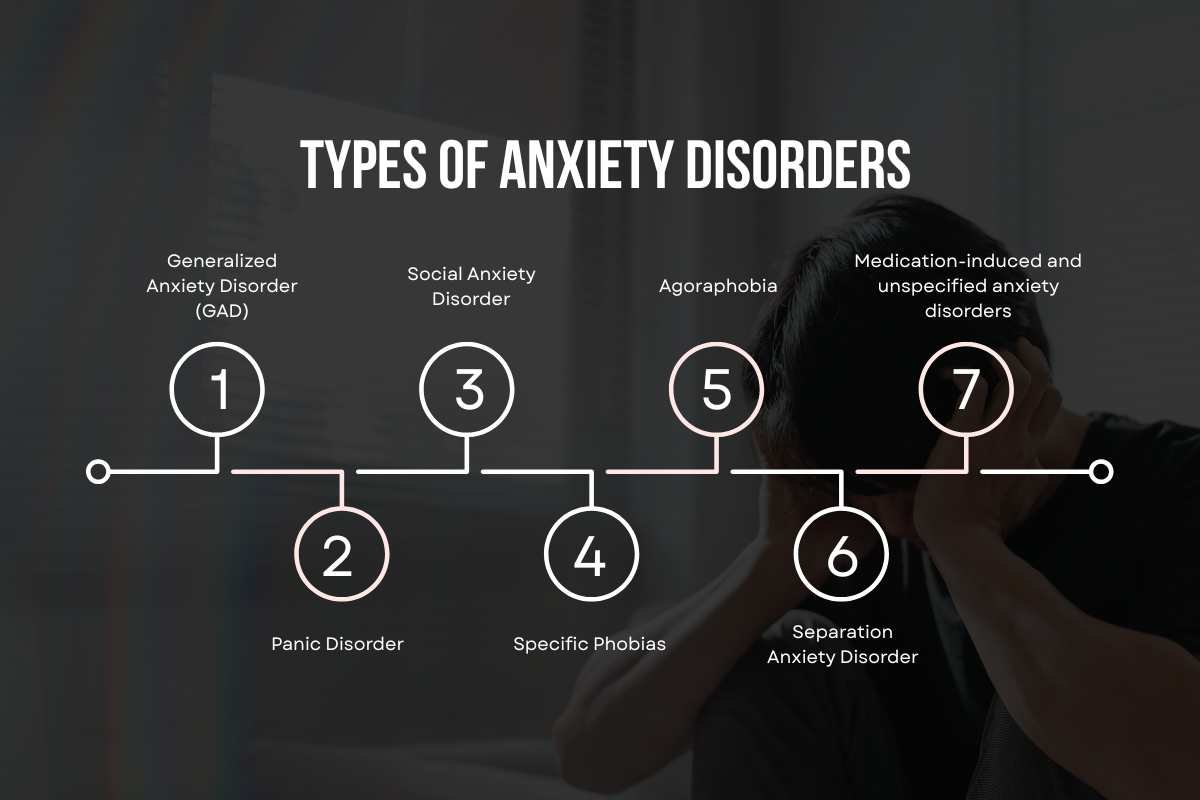Picture a switch that could mute the restless chatter of a worried mind. A calm landing when the world feels like too much noise. We often reach for “anxiety medications” as a temporary relaxer. It is a chemical buffer against panic or severe stress. But is that all that they are?
While we may refer to them as ‘relaxers’ in a very casual manner. The reality is that the complex ways these substances interact with the brain’s complex wiring. Followed by the loss of anxiety is an absolute unknown.
When we say compounds relieve anxiety. What’s going on behind the scenes? What additional secrets do they have regarding the physiology of fear? And what is the existing chemistry regulating our feelings? Let’s look beyond the label and explore with us. The complicated, frequently misunderstood phase of anxiety medications.
Understanding Anxiety Disorders
An anxiety disorder is defined as a condition that is a mental health disorder associated with extreme, persistent worry, fear, or dread. This is typically not proportional to reality, and that impairs one’s life and functioning.
Anxiety is a typical reaction of humans to stress or perceived threats. It can be positive in supporting engagement and preparing for a task. Anxiety disorder is when there are persistent, uncomfortable, recurring, or excessive feelings of worry and fear. These are the feelings you cannot manage. They affect your daily living, and last for extended periods. It can be months or beyond.
Types of Anxiety Disorders:

- Generalized Anxiety Disorder (GAD): Constant worry about day-to-day matters. Lasting at least six months.
- Panic Disorder: Recurrent, unexpected panic attacks and intense fear of more attacks.
- Social Anxiety Disorder: Intense fear of social situations and being judged or embarrassed.
- Specific Phobias: Extreme fear of a particular object or situation. (e.g., flying, heights).
- Agoraphobia: Fear and avoidance of places or situations. Where escape might be difficult.
- Separation Anxiety Disorder: Severe fear of being separated from people you are emotionally close to.
- Medication-induced and unspecified anxiety disorders: Anxiety triggered by medication use or other medical conditions.
After getting an overview of what anxiety disorders are. Let’s focus on anxiety medications and get some detailed insights about them.
What You Need to Know about Different Types of Anxiety Medications:
Let’s break down the most common medications for anxiety. We will also see how they work. And what you need to know about each class and emerging options.
1. SSRIs (Selective Serotonin Reuptake Inhibitors)
- How They Work: Increase serotonin levels in the brain by blocking its reuptake. It improves mood and reduces anxiety.
- Common Examples: Fluoxetine (Prozac), Sertraline (Zoloft), Escitalopram (Lexapro), Paroxetine (Paxil), Citalopram (Celexa).
- Side Effects: Nausea, headache, sleep changes (insomnia or drowsiness), diarrhea, sexual side effects, increased anxiety at start (usually temporary), rare risk of suicidal thoughts in young adults, and occasionally bleeding.
2. SNRIs (Serotonin-Norepinephrine Reuptake Inhibitors)
- How They Work: Block the reuptake of both serotonin and norepinephrine. Addressing anxiety and sometimes pain.
- Common Examples: Venlafaxine (Effexor XR), Duloxetine (Cymbalta), Desvenlafaxine (Pristiq).
- Side Effects: Nausea, dry mouth, dizziness, increased blood pressure (especially with higher doses), insomnia, sweating, risk of serotonin syndrome, and, rarely, low sodium levels.
3. Benzodiazepines
- How They Work: Improve the effect of the neurotransmitter GABA. Helps in producing quick, calming, and muscle-relaxing effects. By slowing brain and nervous system activity.
- Common Examples: Alprazolam (Xanax), Diazepam (Valium), Lorazepam (Ativan), Clonazepam (Klonopin), Chlordiazepoxide (Librium).
- Side Effects: Drowsiness, dizziness, confusion, impaired coordination, and memory problems. With risk of falls, depression, and dependence/addiction (especially with long-term use). Withdrawal can cause anxiety, tremors, sleep problems, and—rarely—seizures.
4. Buspirone
- How It Works: Modulates serotonin and dopamine receptors. It offers anti-anxiety effects without sedation or risk of dependence.
- Common Example: Buspirone (Buspar).
- Side Effects: Dizziness, headache, nausea, lightheadedness, nervousness, and excitation. Rarely, it can raise the risk of serotonin syndrome. When combined with other drugs, and movement problems (tremor or stiffness). Usually mild and does not impair alertness.
5. Beta-blockers
- How They Work: Block the effects of adrenaline on beta-receptors. This reduces physical symptoms of anxiety (like rapid heartbeat, shaking). But they do not affect emotional symptoms.
- Common Examples: Propranolol, Atenolol, Metoprolol.
- Side Effects: Fatigue, cold hands/feet, dizziness. With a slow heart rate, low blood pressure, nausea, and constipation. May cause sleep issues or mask symptoms of low blood sugar in diabetics.
6. Other/Emerging Options (2025)
New approaches are emerging. But many are still experimental or not widely prescribed:
- Vortioxetine and Vilazodone: Antidepressants that act on multiple serotonin receptors. It is being studied for anxiety.
- Pregabalin: Used off-label for social anxiety, modifies GABA signaling.
- Agomelatine: Works on melatonin and serotonin, being trialed.
- Ketamine: Rapid-acting, but mainly researched for depression and PTSD.
- Several others are targeting neuropeptides, glutamate, or dopamine. They are in clinical trials, but not yet standard treatments.
Quick Reference Table
| Medication | How It Works / Use | Common Side Effects | Key Risks/Notes |
| SSRIs | Boost serotonin; 1st line | GI upset, sleep/sex changes | Suicidality (<25), bleed |
| SNRIs | Boost serotonin/norepinephrine | Nausea, dizziness, and BP increase | Bleeding, serotonin syndrome |
| Benzodiazepines | Relax via GABA; rapid relief | Drowsy, memory, dependence | Addiction/withdrawal |
| Buspirone | Serotonin modulator; non-sed. | Dizziness, headache, nausea | Not for fast relief |
| Beta-blockers | Lower physical symptoms | Fatigue, cold extremities | Not for daily use |
| Emerging options | Novel targets, clinical trials | Varies | Still experimental |
Benefits and Limitations of Anxiety Medications:
Anxiety medications offer significant benefits. But they are not without substantial limitations and risks.

Benefits of Anxiety Medications
- Rapid Symptom Relief: Many medications, especially benzodiazepines. It can quickly alleviate anxiety symptoms. Like excessive worry, panic, and physical tension.
- Improved Functioning: Reducing anxiety can restore daily functioning. It also improves sleep, mood, and ability to work or socialize.
- Effective for Severe Anxiety: For moderate to severe generalized anxiety disorder (GAD). Along with other clinical anxiety types. Antidepressants (SSRIs, SNRIs) show significant, reliable benefit over placebo. Approximately 1 in 7 patients treated will see a meaningful reduction in symptoms.
- Adjunctive in Therapy: Medications improve the effect of psychotherapy. Or enable participation in therapy. Patients for whom anxiety would otherwise prevent it.
- Physical Symptom Control: Beta-blockers can control heart racing. Along with trembling and other physical symptoms in stressful situations.
Limitations and Risks

- Side Effects and Tolerability: All classes have side effects. It can range from mild (nausea, headache). And can be severe (sexual dysfunction, increased blood pressure, sedation).
- Dependency and Withdrawal: Benzodiazepines can cause dependence, tolerance, and withdrawal symptoms. With cognitive/motor impairment with long-term use. Even antidepressants can have withdrawal issues if stopped abruptly.
- Not a Cure: These medications manage, not cure, anxiety. Underlying causes like psychological and behavioral. They often persist and require therapy or lifestyle intervention.
- Effect Size and Duration: Some studies suggest the effectiveness of SSRIs and SNRIs. It is less anxious. With substantial benefit only in a subset of patients. Benefits typically start after several weeks. And may plateau or diminish over longer periods.
- Risk of Adverse Reactions: Antidepressants can sometimes worsen mood or increase suicidal thoughts. Especially in younger people. Benzodiazepines increase the risk of falls and injury. Majorly in elderly patients and when interacting with other depressant drugs.
- Discontinuation Difficulties: Stopping medications abruptly can lead to rebound anxiety or withdrawal. This is sometimes worse than the initial anxiety.
Also Read:
- Understanding Anxiety Medication: Types, Uses, and Considerations
- Common Phobias: Understanding the Most Common Fears
- Dependent Personality Disorder: Understanding, Symptoms, and Treatment
Experts’ Insight on Anxiety Medications:
Choosing the right anxiety medications is a deeply personalized process. It requires careful evaluation. Here is some advice from experts to help you:
1. Dr. Jane M. Thompson, Psychiatrist:
“Selecting the right medication for anxiety is a highly individualized process. SSRIs and SNRIs are generally preferred as first-line options. Due to their balance of efficacy and safety. The choice depends on the patient’s specific symptoms, medical history, and tolerability.”
2. Dr. Maria Lopez, Clinical Pharmacologist:
“For patients with comorbid conditions like chronic pain or certain mood disorders. SNRIs can offer dual benefits. Historically, benzodiazepines are reserved for short-term relief. Or severe episodes due to dependence risks.”
3. Dr. Amir Garakani, Anxiety Specialist:
“In practice, the choice often involves shared decision-making with the patient. Considering factors such as onset speed, side effect profiles, and previous medication responses. With patient preferences about sedation or activation effects.”
Conclusion
Anxiety medications do not work as a cure-all solution. But rather as a complex therapeutic solution. With the gradual and steady lift from SSRIs and SNRIs. Factors like benzodiazepines can provide rapid, albeit short-lived, calmness. It represents a class of medications that each work as a tool. With their associated benefits and trade-offs.
The pursuit of lasting calm requires an evolved perspective on the prescribed medication. Starting from a chemical relaxer to an individualized treatment plan. It is usually with some basic groundwork of therapy. And centered on professional knowledge, help, and patient preferences. As the machinery of fear begins to become manageable.
FAQs:
1. Can I combine anxiety medications with therapy?
Yes, and it’s often the most effective approach. Research consistently shows that medication combined with cognitive behavioral therapy (CBT). It offers better long-term results than either treatment alone. Medication helps stabilize brain chemistry. While therapy teaches coping strategies to handle triggers. Many psychiatrists recommend a natural treatment plan. It involves therapy, medication, and lifestyle changes such as exercise and meditation.
2. Are natural or herbal remedies effective for anxiety?
Some natural options, such as ashwagandha, chamomile, and lavender. It may provide mild relief for mild anxiety. But they’re not replacements for prescription medication in moderate to severe cases. Always consult your doctor before combining herbal supplements with anxiety medications. As interactions can alter effectiveness or cause side effects.
3. Are anxiety medications safe during pregnancy or breastfeeding?
Some anxiety medications are considered safer than others during pregnancy. But no drug is entirely risk-free. SSRIs like sertraline are often preferred under close supervision. Always consult both your psychiatrist and obstetrician. Before making any changes to medication during pregnancy or breastfeeding.







